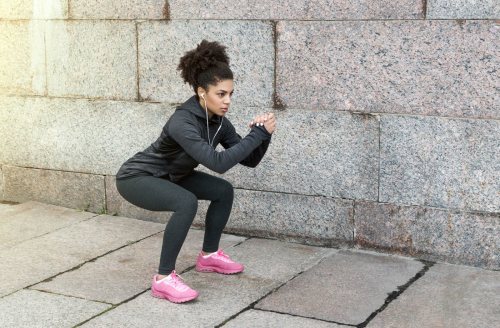The results-driven reason to start counting reps when your muscles shake
All reps are important, but there's an important reason why trainers say you should start counting reps when your muslces start shaking during a workout.

Usually, the second my muscles start shaking, I’m out. I’ve already put in the work—whether I’m doing planks or bicep curls; lunges or squats. Because IMHO, once my entire body begins to gyrate, that’s a pretty good sign that I’ve put in some good work, and can move onto the next thing. But more and more trainers are saying to push through that pain and start counting reps at the point of exhaustion, and their argument is one that’s hard to negate: results.
“The reason trainers might say ‘start counting your reps when your muscles start shaking’ is because this is a point where your muscles are definitely being challenged and looking to recruit more muscle fibers,” says Ricardo Rose, instructor at EverybodyFights. According to Rose, by fatiguing muscles and doing more than 12 reps, you’re able to build muscular endurance, while getting stronger in the process.
But the main reason that trainers say this is because we tend to hit fitness plateaus and frequently don’t push out of them to reach the next level. “If you’ve been training with the same set and rep structure over time, you’ll need to make one of two adjustments. Your first step is to increase the weight being lifted. Then, increase the repetitions,” he says. “Most programs call for a basic rep and set structure—for example, the classic three sets of 10 reps. For a more advanced fitness goer, pushing past those 10 reps will create a greater challenge and get you to a point where your muscles ‘start to shake.'”
If you’re not into the idea of pushing yourself through the burn—literally—there’s a different solution. Emily Samuel, a trainer at New York City’s Dogpound, says instead of waiting to count your reps after your muscles start shaking, simply switch the amount of weight you’re using, which similarly challenges the body in a new way.
“If you’re doing 15 uncounted reps and not feeling anything, you’re just not lifting heavy enough. Put down those one-pound weights and truly challenge yourself,” she says. “If you’re able to do more than 15 reps of an exercise easily, pick up a heavier weight. By the end of the 15 reps, it should be at a level seven out of 10 difficulty.”
In the end, it’s always best to listen to your body and see what works for you. Whatever your desired tactic may be, it won’t be long before you notice yourself getting stronger.
Want other fitness tips? Here’s how increasing your weights by just five pounds can seriously up your game. Then check out this beginner’s guide to lifting weights at the gym.
Sign Up for Our Daily Newsletter
Get all the latest in wellness, trends, food, fitness, beauty, and more delivered right to your inbox.
Got it, you've been added to our email list.










